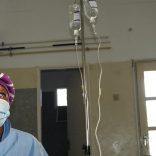Groups call for zero tolerance on sexual harassment of students in Mozambique
Mozambique: Health workers’ association extends suspension of strike by 15 days

Photo: O País
The Association of United and Solidary Health Professionals of Mozambique (APSUM) today announced a 15-day extension of its suspension of strike action in the sector, so as to continue negotiations and in light of the turbulent post-election situation.
“There will be no resumption [of strike action] for another 15 days, to give the government space to respond to current political tension, so as not to be diverted. Because the political tension from October 11th ended up interrupting the dialogue between APSUSM and the government,” APSUSM president nurse Anselmo Muchave told a press conference in Maputo.
APSUSM had announced on August 27th the suspension, until November 5th, of the strike that began a week earlier, to create room for negotiations with the government.
Mozambique held local elections on October 11, which according to the National Elections Commission (CNE) gave victory to the Front for the Liberation of Mozambique (Frelimo, the ruling party) in 64 of the 65 municipalities. However, street demonstrations promoted by the opposition continue against the results, which are also criticised by civil society, observers and non-governmental organisations.
“Because health workers are still not satisfied with the points presented at the dialogue table, also so as not to confuse their demands with the results of the elections, health professionals will peacefully perform their jobs for another 15 days, until November 18, until the situation normalises,” APSUSM president Muchave said.
Muchave guaranteed that there would be no “resumption” of demonstrations by APSUSM members for 15 days, given that 45% of their demands had been met. “We hope that all the points that can be quickly resolved have already been achieved. Some are already at a good pace,” he observed.
In July and August, the Mozambican National Health System faced a crisis caused by strikes called first by the Medical Association of Mozambique (AMM), which would also suspend its protest, and then by APSUSM, which is also seeking better working conditions for other health professionals.
According to the president of APSUSM, the 27 August decision resulted from an appeal made by the Mozambican head of state, Filipe Nyusi, to make room for talks with a new government team trying to halt the collapse of the national health system.
Among other aspects, APSUSM, which covers around 65,000 technicians, orderlies and nurses, requires the government to provide hospitals with medicines which in some cases currently have to be purchased by patients, and also to guarantee the acquisition of hospital beds, resolve the problem of the “lack of food” in health units and equip ambulances with emergency life support materials and non-disposable personal protective equipment, the lack of which is “forcing employees to buy [it] out of their own pockets”.
Also at the end of August, the Medical Association of Mozambique (AMM) announced the interruption, until October 2, of the strike that had been ongoing since July 10, to give time for talks with the new negotiating group led by Mozambican prime minister Adriano Maleiane.
However, AMM has for more than a month not commented on whether or not it will resume strike action.
The AMM previously considered the Mozambican executive had shown no interest in solving the problem in the health system, as a result threatening to paralyse the minimum services that the class was providing during the strike of those professionals, who are mainly protesting against salary cuts within the scope of the application of the new civil service salary table, and the non-payment for overtime.
The application of the new single salary table (TSU) in the public service is the subject of strong opposition from various professional classes, with salary delays and cuts criticised by various segments of the Mozambican state apparatus.













Leave a Reply
Be the First to Comment!
You must be logged in to post a comment.
You must be logged in to post a comment.